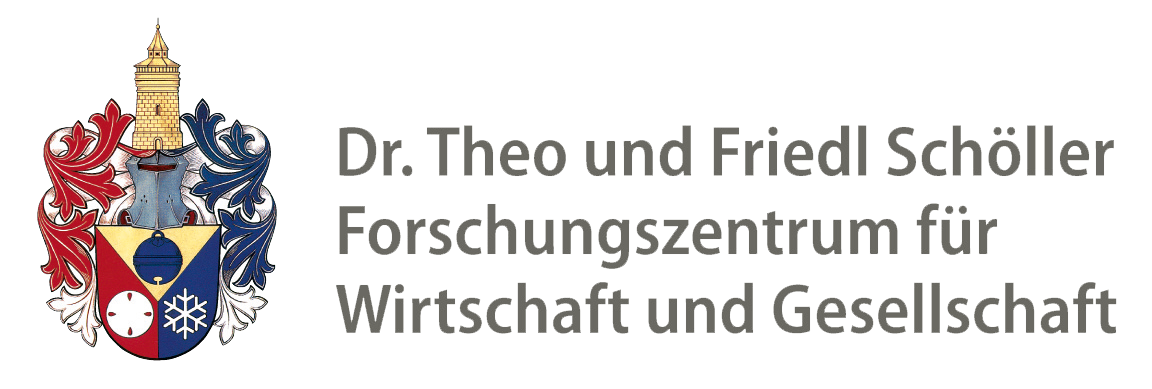
“It is our great pleasure to welcome the Fellowship Recipients of 2021 to the Dr. Theo and Friedl Schöller Research Center for Business and Society.
For twelve years now, thanks to the generous support of the Schöller-Foundations, the Schöller Research Center has been able to honor outstanding scientists as Schöller Fellows and support their research projects financially. Hence, we take up existing research strengths in the field of Business and Economic studies, promote particularly recognized young scientists and strengthen international cooperation between researchers for responsible action in business and society.
We warmly welcome the six Fellowship Recipients of 2021 to the group of now 61 Schöller Fellows at the Schöller Research Center, look forward to the discourse and to the progress in their research.”
Prof. Dr. Michael Amberg and Prof. Dr. Sven Laumer
Directors of Dr. Theo and Friedl Schöller Research Center

“Like the Schöller Foundations, the Schöller Research Center is firmly rooted in the Nuremberg region, but its branches extend far beyond that. The exchange between the scientists at the Friedrich-Alexander University Erlangen-Nuremberg (FAU) and the Schöller Fellows drives the international networking of our region forward. The Research Center is thus one of the showcase projects of the Schöller Foundations.
Since its establishment, the Schöller Research Center has shown that it can initiate important future discussions. Such impulses eventually form the basis for innovative and successful entrepreneurship. Thus, we have come full circle to the Schöller Foundations, which feel particularly connected to entrepreneurship. Entrepreneurial success enabled my husband and me to give back to society in the first place. May the research results of the Schöller Fellows play a decisive role in shaping our future in a positive sense.”
Friedl Schöller
Chairwoman of the Schöller-Foundations (2004-2014)

“Research at the Dr. Theo and Friedl Schöller Research Center for Business and Society contributes to shaping our common future. The Research Center thus ideally embodies the goals of the Theo and Friedl Schöller-Foundation.”
Rainer Hattenberger and Dr. Felix Hechtel
Heads of the Schöller-Foundations

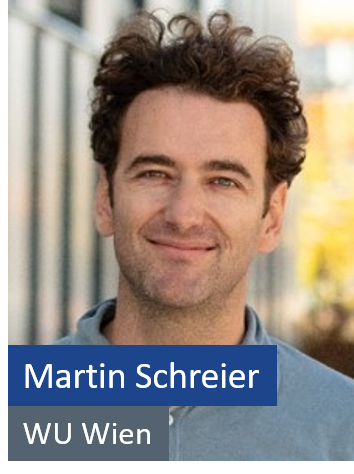
Prof. Dr. Martin Schreier is Professor of Marketing at WU Vienna. Before joining WU, he was a tenured faculty member of the marketing department at Bocconi University, Milan (Italy). His teaching and research interests are anchored in core topics of marketing, including product and brand management, creativity and new product development, and consumer behavior.
His work has been published in premier journals such as the Journal of Marketing or Management Science, awarded with several best paper awards, and featured in international media outlets. He currently serves as an Associate Editor at the Journal of Marketing and is the Editor-in-Chief Elect of the International Journal of Research in Marketing.
University Knowledge Inside: How and When University-Industry Collaborations Make New Products More Attractive to Consumers
Firms increasingly collaborate with universities to find innovation success. This research project is the first to investigate how consumers perceive university-co-developed products. Initial evidence suggests a positive inferential process such that consumers experience products co-developed with a university to be more sophisticated and trustworthy compared to firm-internally developed products or products co-developed with merely another firm. Consequently, consumers might be more eager to purchase such products.
This research aims to advance our understanding of university-industry collaborations by showing how and when involving universities as an innovation partner might be beneficial for marketing purposes.

“It is essential to us to build a beacon for business and economic studies that sends positive signals into the world, spreads knowledge and orientation, and serves as a role model for others. The Schöller Research Center is in the truest sense of the word a lighthouse project for international cooperation in the field of business and economic studies.”
Dr. Günther Beckstein
Former Minister-President of Bavaria
Ambassador of the Schöller-Foundations

“Science has a lot to do with the future of our society, which is why we should promote it in every way. But let’s also make sure that the progress it brings belongs to us and not vice versa.”
Prof. Dr. Jürgen Mittelstraß
Director of the Konstanz Science Forum
Schöller Honorary Fellow

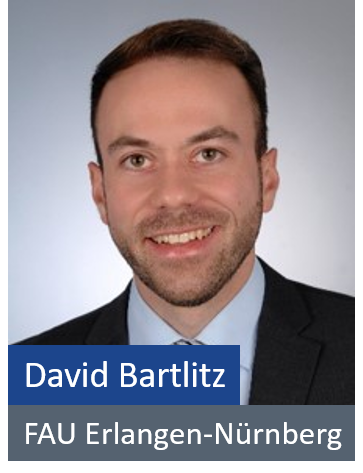 Dr. David Bartlitz studied law at the Friedrich-Alexander University Erlangen-Nuremberg. After finishing his doctorate on the topic: “The liability of the limited partner on the basis of corporate law principles”, he completed his legal clerkship in the district of the Stuttgart Higher Regional Court.
Dr. David Bartlitz studied law at the Friedrich-Alexander University Erlangen-Nuremberg. After finishing his doctorate on the topic: “The liability of the limited partner on the basis of corporate law principles”, he completed his legal clerkship in the district of the Stuttgart Higher Regional Court.
After his second state examination in law, he returned full-time to the Friedrich-Alexander University Erlangen-Nuremberg and has been there since then as Postdoctoral Researcher at the Chair of Private Business Law. His main research interests are civil law as well as corporate and banking law.
Digital Legal Fact Research
Research into legal facts serves to identify actual deviations of legal effects from legal objectives, to determine actual problems in legal practice and to analyse actual circumstances to support legal-dogmatic interpretation processes. It differs significantly from the “classical”, purely normative legal science and is much more similar to the empirical economics and social sciences.
So far, legal fact research in Germany has only been carried out in an analogue manner. The idea of digital legal fact research, however, consists in obtaining and analyzing legal facts for the first time using business informatics working methods.

“In its 100 years, the School of Business, Economics and Society at the FAU Erlangen-Nuremberg has produced numerous distinguished personalities. The Dr. Theo und Friedl Schöller Research Center gratefully and successfully contributes to the continuation of this tradition and to keeping knowledge in motion.”
Prof. Dr.-Ing. Joachim Hornegger
President of the FAU Erlangen-Nuremberg

“The comparatively good economic situation in Germany must not make us reckless; the lead is quickly lost. Applied research, as promoted by the Schöller-Foundations and the Schöller Research Center, helps to ensure people’s well-being.”
Prof. Dr. Peter Mertens
One of the founding fathers of Business Informatics
Schöller Honorary Fellow

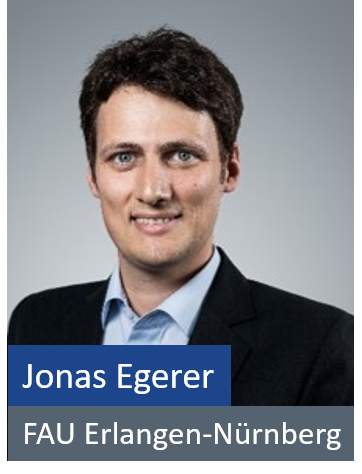 Dr. Jonas Egerer holds a master degree in industrial engineering from the Technical University of Dresden. He continued his academic career as research associate at the German Institute for Economic Research (DIW Berlin) and the Technical University of Berlin, where he received his PhD in 2016 after research stays at the Universidad Pontificas Comillas Madrid, the NTNU Trondheim, and the European University Institute in Florence.
Dr. Jonas Egerer holds a master degree in industrial engineering from the Technical University of Dresden. He continued his academic career as research associate at the German Institute for Economic Research (DIW Berlin) and the Technical University of Berlin, where he received his PhD in 2016 after research stays at the Universidad Pontificas Comillas Madrid, the NTNU Trondheim, and the European University Institute in Florence.
Since 2017, he conducts research on the climate-neutral transformation of liberalized energy markets as a post-doc researcher at the FAU Erlangen-Nuremberg and the Energie Campus Nürnberg (EnCN).
Market Design of Electricity and Hydrogen Markets in Multi-Level Energy Market Models
The transformation to a sustainable energy system requires the switch from fossil to carbon-free energy sources, in particular renewable power generation and hydrogen. This requires the further development of energy market design in order to open up long-term business models on investments for market players, especially at the link between electricity and hydrogen markets.
The aim of the research project is to develop multi-level market models for coupled energy markets of different energy carriers. With regionally resolved data sets, these can be used to study the impact of market design on grid infrastructure for energy transport as well as regional and supra-regional development in the energy system in the medium-term market equilibrium.

“It was particularly important to Theo and Friedl Schöller – whose sponsorship made the Research Center possible in the first place – that their Fellows and Senior Fellows act as ambassadors for business and economic research with Nuremberg influence around the world.
I would also like to see Nuremberg become internationally known as an excellent science and research location through the work of the Fellowship recipients, one that feels particularly committed to humanitarian values.”
Dr. Ulrich Maly
Former Mayor of Nuremberg

“Innovation is not just a technical process, it is a social process. We can demand this exchange beyond the limits of our own competence, but we must also encourage it in order to make our society fit for the future.”
Prof. Dr. Hans-Jörg Bullinger
Former President of the Fraunhofer Society
Schöller Honorary Fellow

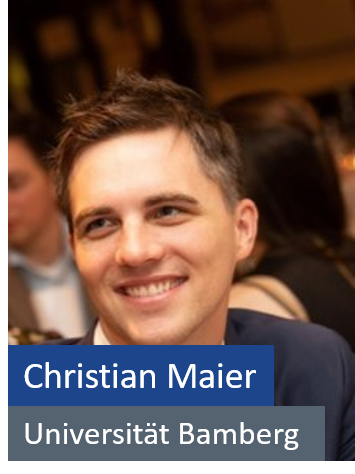 PD Dr. Christian Maier is Assistant Professor at the University of Bamberg. His research focuses on the positive and negative effects of digitalization on individuals and companies. His research results have been published in journals such as MIS Quarterly or Journal of the Association for Information Systems and have been presented in radio and television programs (e.g., ZDF, RTL, 3Sat).
PD Dr. Christian Maier is Assistant Professor at the University of Bamberg. His research focuses on the positive and negative effects of digitalization on individuals and companies. His research results have been published in journals such as MIS Quarterly or Journal of the Association for Information Systems and have been presented in radio and television programs (e.g., ZDF, RTL, 3Sat).
He was awarded the Schmalenbach prize (2015), the prestigious Early Career Awards by the AIS (2019) and the ACM SIGMIS (2020), several Best Paper Awards, and the University Award for Good Teaching (2019). In his free time, he enjoys cycling and eating out with family and friends.
Trial-Period Technostress: Theoretical Conceptualization, Empirical Investigation, and Practical Implications
Many people experience technology-related stress, or technostress, on a daily basis. While technostress is now commonplace at work, it is increasingly making its way into people’s private lives. For example, technostress is cited as one reason why about one in nine tablets is returned within the first 30 days.
As this costs the economy several billion per year, the research project aims to study trial-period technostress, that is the stress during the initial use of a newly acquired technology in private life. By means of an experiment, we aim to identify causes of technostress and their influence on user behavior, e.g. the willingness to pay or the return of the purchased technology.

“Research achievements and the resulting innovations represent the basis for growth, jobs, and prosperity in highly developed, but resource-poor countries such as Germany. The effective implementation of these innovations in particular is the key to sustainable economic success.
By examining issues that are important for business and society, scientific research makes a significant contribution to strengthening Germany as a location for innovation and thereby also opening up new opportunities for companies. Therein the Dr. Theo and Friedl Schöller Research Center for Economy and Society makes a valuable contribution in the field of innovative cutting-edge research and thus assume a great social responsibility.”
Prof. Dieter Kempf
Vice-President of the Federation of German Industries (BDI)
Member of the Data Ethics Commission by the Federal Government

“Social welfare only arises through openness and cross-border personalities in politics, business, and science. The Schöller Research Center provides crucial impulses for this.”
Prof. Dr. Helmut Haussmann
Former Minister of Economics of Germany
Schöller Honorary Fellow

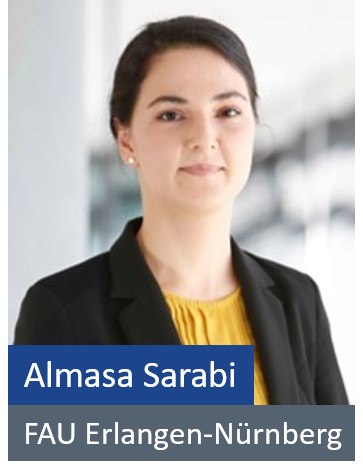 Prof. Dr. Almasa Sarabi is Assistant Professor of International Human Resource Management at FAU Erlangen-Nuremberg. She studied linguistics, cultural studies, and business administration in Hamburg, Goettingen, Pune (India), and Uppsala (Sweden) and obtained her PhD in Goettingen in 2017 with research stints in South Korea and Canada.
Prof. Dr. Almasa Sarabi is Assistant Professor of International Human Resource Management at FAU Erlangen-Nuremberg. She studied linguistics, cultural studies, and business administration in Hamburg, Goettingen, Pune (India), and Uppsala (Sweden) and obtained her PhD in Goettingen in 2017 with research stints in South Korea and Canada.
In her research, she examines new patterns in work and employment. Specifically, her research focuses on hiring practices in organizations with current projects examining gender bias and women’s allocation to jobs. A second focus of her research explores gender-based communication differences in how managers talk about their work in situations of uncertainty.
Gender Bias in Hiring: The Role of Hiring Managers
Do hiring managers discriminate against women at the point of hire? This question is examined in the context of real hiring decisions of a quasi-randomized field experiment. Specifically, the project takes advantage of a change in the hiring system of a multinational corporation that reduced the discretion of its hiring managers.
The project shows that changing hiring criteria can alter an organization’s gender composition at point of hire and aims at bringing us one step closer to identifying the causes of social inequality.

“Strengthening education and research – this has been part of the brand essence of the Chamber of Commerce and Industry since it was founded in 1843. In 1919, it was the driving force behind the establishment of the Nuremberg Commercial College, which later became the School of Business, Economics and Society. The Schöller Research Center continues the tradition of excellent cooperation between business and economics in an exemplary fashion.”
Markus Lötzsch
Chief Executive Officer of the Nuremberg Chamber of Commerce and Industry

“With the Dr. Theo and Friedl Schöller Research Center, we aim to promote outstanding scientists who, with their professional qualifications and a high sense of responsibility, face pressing social issues. Science is only sustainable and meets the requirements of society and the complexity of research topics through professional and cross-border networking.”
Prof. Dr. Karl-Dieter Grüske
Former President of the FAU Erlangen-Nuremberg
Schöller Honorary Fellow

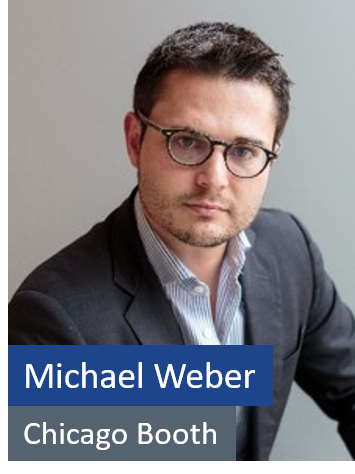 Prof. Michael Weber, Ph.D. joined Chicago Booth in 2014 as an Assistant Professor of Finance and was promoted to Associate Professor in 2018. He earned a Master’s degree in Business Economics from the University of Mannheim and a PhD in Finance from University of California, Berkeley. He is also a faculty research fellow at the National Bureau of Economic Research in the Monetary Economics and Asset Pricing groups, Research Affiliate in the Monetary Economics and Fluctuations programme of CEPR, a member of the monetary group of the Verein fuer Socialpolitic, a member of the Macro Finance Society, a Research Professor at Ifo Institute and a research affiliate at the CESifo Research Network.
Prof. Michael Weber, Ph.D. joined Chicago Booth in 2014 as an Assistant Professor of Finance and was promoted to Associate Professor in 2018. He earned a Master’s degree in Business Economics from the University of Mannheim and a PhD in Finance from University of California, Berkeley. He is also a faculty research fellow at the National Bureau of Economic Research in the Monetary Economics and Asset Pricing groups, Research Affiliate in the Monetary Economics and Fluctuations programme of CEPR, a member of the monetary group of the Verein fuer Socialpolitic, a member of the Macro Finance Society, a Research Professor at Ifo Institute and a research affiliate at the CESifo Research Network.
He is also academic consultant for the European Central Bank, the Federal Reserve Bank of Cleveland, the Bank of Finland, and several other central banks. His research interests include asset pricing, macroeconomics, international finance, and household finance. He has published in leading economics and finance journals such as the American Economic Review, the Review of Economic Studies, the Journal of Political Economy, the Review of Financial Studies and the Journal of Financial Economics.
Diverse Policy Committees Can Reach Underrepresented Groups
The composition of many central banks around the world lack a diverse composition of the governing bodies, while at the same time large heterogeneity exists in the extent to which different subpopulations are informed about central pillars of monetary policy. While many reasons exists for a diverse composition such as ethical consideration or the moving away from group think, these channels might be difficult to measure using the economics toolbox.
Instead, we aim to shed light on whether diverse committees might be more effective in reaching the overall population with their communication. Central bank communication has become a stand-alone policy tool especially during times of low interest rates. We implement an information provision experiment within a survey in which we vary the degree of salience of the committee in a randomized fashion to the survey population. Specifically, all survey participants see a regional Fed president but subsets of the survey see a white female, a black male, or a white male policy maker together with identical forecasts for the unemployment rate.
We then compare the extent to which individuals incorporate these forecasts into their own subjective expectations and to which extent it differs across demographic and racial groups. Finally, we study the channels that mediate the effects such as trust in the central bank, taste for diversity, homopholy, and an information acquisition channel.

“Economy as well as business and economic sciences have the task of contributing to the improvement of living conditions globally and locally. This requires lateral thinkers who combine creativity with methodological rigor, international cooperation, and a local focus.”
Prof. Dr. Dr. h.c. Margit Osterloh
Research Director of CREMA

“The performance of a university, its academic quality, and its international perception are ultimately always determined by the people who work for it.”
Thomas A. H. Schöck
Former Chancellor of the FAU Erlangen-Nuremberg
Schöller Honorary Fellow

We are looking forward to seeing you again at our Award Ceremony in 2022! Until then, please enjoy our throwback on the ceremonies 2010-2019:
More videos of our former events can be found here.

